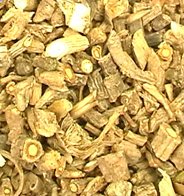Fang Feng

| Fang Feng in TCM:Explore the properties of Fang Feng according to Chinese
Nutrition and Traditional Chinese Medicine (TCM):
Factoids:
English Name: siler, ledebouriella root
Pharmacuetical Name: Radix Saposhnikoviae
Properties: acrid, sweet, slightly warm
Temperature: warm
Channels: SP, UB, LV
Flavors: sweet, pungent
Special Properties:
clears heat, clears damp, disperses wind, alleviates bi syndrome
Actions / Indications:
- Dispel wind, release exterior (external wind: can
be either wind cold or wind-heat depending on which other herbs it is
combined with)
- Expels Wind Damp; Alleviate Pain associated with Bi
(Relieves skin itching, Wind Damp Bi especially when wind is more predominant)
- Expels Wind in Channels (migraines, tetanus, wind
in the channels, external wind lodged very deep inducing internal wind,
trembling hands, feet, )
- Expels Intestinal Wind (SP / LV imbalance with recurring
painful diarrhea or bright blood in stool)
Special Notes:
- Often paired with Jing Jie
- Fang Feng is known as the 'wind herb that doesn't dry'
- Fang Feng is known as having 4 functions for
wind (compare with Cang Zhu which
has 4 functions for damp)
Contraindications:
- (cc: blood or yin deficiency with spasms)
- (cc: yin deficiency with heat)
Disclaimer: In accordance with our terms of service, by using this web site you agree that none of the information found on this web site constitutes medical advice. You should always consult your doctor before trying any particular food or herbal remedy to treat disease.
Folk remedies presented on this site are designed to address specifc TCM diagnoses, and are not one-size-fits-all. If you would like to learn more about Traditional Chinese Medicine (TCM) and how it relates to Chinese Nutrition, you can book in a free call with a licensed professional. There is no obligation to purchase.
[CLICK HERE for your free INITIAL CONSULTATION] |
